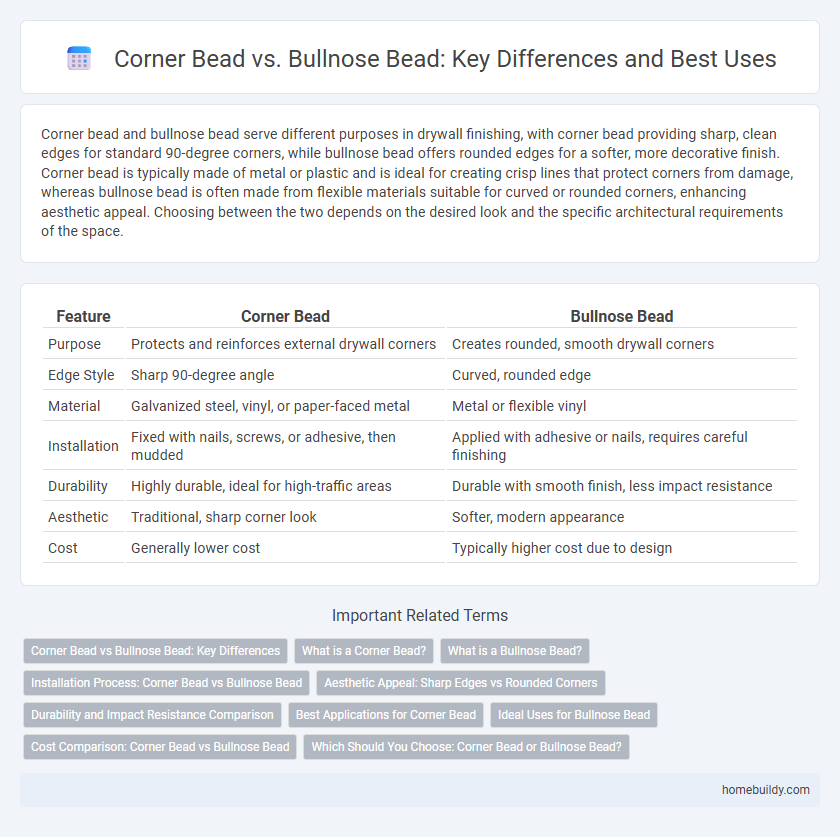Corner bead and bullnose bead serve different purposes in drywall finishing, with corner bead providing sharp, clean edges for standard 90-degree corners, while bullnose bead offers rounded edges for a softer, more decorative finish. Corner bead is typically made of metal or plastic and is ideal for creating crisp lines that protect corners from damage, whereas bullnose bead is often made from flexible materials suitable for curved or rounded corners, enhancing aesthetic appeal. Choosing between the two depends on the desired look and the specific architectural requirements of the space.
Table of Comparison
| Feature | Corner Bead | Bullnose Bead |
|---|---|---|
| Purpose | Protects and reinforces external drywall corners | Creates rounded, smooth drywall corners |
| Edge Style | Sharp 90-degree angle | Curved, rounded edge |
| Material | Galvanized steel, vinyl, or paper-faced metal | Metal or flexible vinyl |
| Installation | Fixed with nails, screws, or adhesive, then mudded | Applied with adhesive or nails, requires careful finishing |
| Durability | Highly durable, ideal for high-traffic areas | Durable with smooth finish, less impact resistance |
| Aesthetic | Traditional, sharp corner look | Softer, modern appearance |
| Cost | Generally lower cost | Typically higher cost due to design |
Corner Bead vs Bullnose Bead: Key Differences
Corner bead and bullnose bead serve different purposes in drywall finishing, where corner bead provides a sharp, crisp edge for exterior corners, enhancing durability and preventing damage. Bullnose bead features a rounded edge, creating soft, curved corners that offer a smoother aesthetic and are safer for high-traffic areas or homes with children. The choice between corner bead and bullnose bead depends on the desired edge appearance and functionality, impacting overall wall protection and style.
What is a Corner Bead?
A corner bead is a metal or plastic strip designed to reinforce and protect external drywall corners, ensuring clean, straight edges and preventing damage from impacts. Unlike bullnose beads that create rounded corners for a softer, curved finish, corner beads produce sharp, 90-degree angles commonly used in standard drywall installations. The materials for corner beads include galvanized steel, aluminum, vinyl, and paper-faced options, each offering durability and ease of installation for different construction needs.
What is a Bullnose Bead?
A bullnose bead is a drywall accessory designed to create smooth, rounded corners on walls, enhancing durability and aesthetics compared to the sharp edges produced by standard corner beads. Unlike traditional metal corner beads, bullnose beads often come in flexible vinyl or metal, allowing for a softer, curved finish that resists chipping and damage in high-traffic areas. This rounded profile is ideal for residential and commercial spaces where safety and a polished appearance are priorities.
Installation Process: Corner Bead vs Bullnose Bead
Corner bead installation typically involves attaching metal or plastic strips to drywall corners using nails, screws, or adhesive, followed by mud application for a sharp edge. Bullnose bead installation requires careful shaping and securing of the rounded bead, often using drywall compound to create smooth, curved corners. The bullnose process demands more precision and finishing time compared to the more straightforward corner bead installation.
Aesthetic Appeal: Sharp Edges vs Rounded Corners
Corner bead features sharp edges that create clean, precise lines enhancing the modern aesthetic of walls, while bullnose bead offers rounded corners that provide a softer, more traditional appearance. Sharp edges of corner beads emphasize architectural definition, ideal for contemporary designs, whereas bullnose beads soften transitions and reduce visual harshness. Selecting between the two depends on desired wall texture, interior style, and maintenance considerations.
Durability and Impact Resistance Comparison
Corner bead typically offers superior durability and impact resistance compared to bullnose bead due to its metal or reinforced plastic construction designed to withstand heavy wear. Bullnose bead, while providing a softer, rounded edge that reduces corner damage risk, is generally less robust under high-impact conditions. For environments requiring high resilience, corner bead remains the preferred choice due to its ability to maintain structural integrity over time.
Best Applications for Corner Bead
Corner bead is ideal for reinforcing and protecting sharp drywall corners in high-traffic areas, ensuring durability and a crisp edge. It provides superior resistance to chipping and denting compared to bullnose bead, making it optimal for commercial spaces, hallways, and rooms prone to frequent impact. Its straight edges create clean, precise lines that are essential for modern and minimalist interior designs.
Ideal Uses for Bullnose Bead
Bullnose bead is ideal for creating smooth, rounded edges on drywall corners, providing a softer, more decorative finish compared to the sharp angles of standard corner beads. It is commonly used in residential projects, especially in children's rooms, hallways, and spaces aiming for a contemporary, polished look. The curved design also enhances durability by reducing the risk of chipping and damage in high-traffic areas.
Cost Comparison: Corner Bead vs Bullnose Bead
Corner beads generally offer a more cost-effective solution compared to bullnose beads, making them a preferred choice for budget-conscious drywall projects. Bullnose beads, with their rounded edges and enhanced aesthetic appeal, typically carry a higher price point due to the additional material and manufacturing complexity. When balancing durability, visual finish, and budget, corner beads provide a practical, economical option without sacrificing structural integrity.
Which Should You Choose: Corner Bead or Bullnose Bead?
Corner bead provides sharp, defined edges ideal for modern, angular designs, while bullnose bead offers rounded, softer corners suited for a more traditional, smooth finish. Choosing between corner bead and bullnose bead depends on the desired aesthetic and functionality; corner bead enhances durability and clean lines, whereas bullnose bead reduces the risk of chipping and creates a gentler transition. Both options are available in metal, vinyl, or paper-faced varieties, allowing customization based on durability needs and installation preferences.
corner bead vs bullnose bead Infographic

 homebuildy.com
homebuildy.com